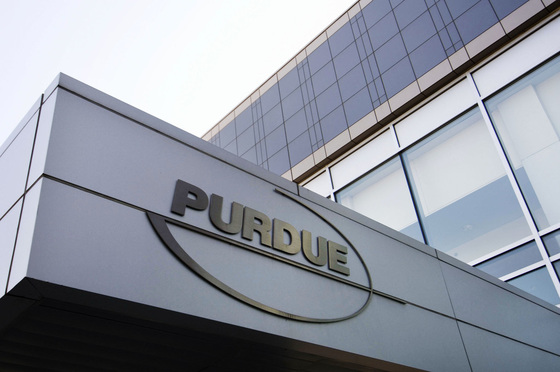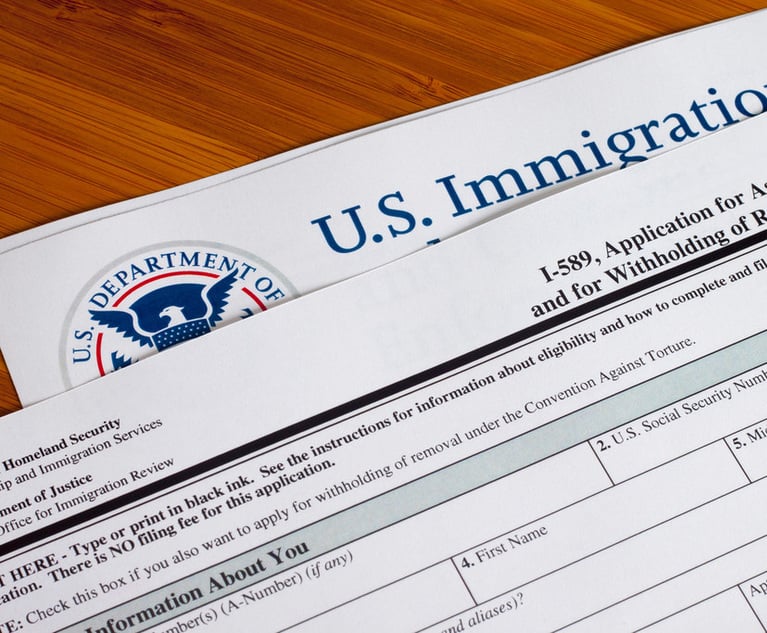'Better Than Nothing:' Experts Weigh In on Purdue Pharma Deal
The attorneys general in New York and Connecticut, among other states, are steadfastly opposed to a recent settlement worth billions with Purdue Pharma; they say it's not enough. Experts weigh in on the chances those states have in collecting by holding out for more.
September 17, 2019 at 04:20 PM
4 minute read
 FILE – Purdue Pharma offices in Stamford, Connecticut. (AP Photo/Douglas Healey, File)
FILE – Purdue Pharma offices in Stamford, Connecticut. (AP Photo/Douglas Healey, File)
Experts disagree on the soundness of Connecticut and New York's decision to continue to litigate against Purdue Pharma, as about 2,600 municipalities took an opposite approach and settled with the drug manufacturer.
For starters, Purdue has since sought Chapter 11 bankruptcy protection, a move that could make it harder for successful litigants to collect damages. Plus, the Wall Street Journal Tuesday reported that the company has moved to shield its owners, members of the Sackler family, from lawsuits by plaintiffs who didn't sign on to the settlement agreement.
Litigating has become an even bigger gamble, said Lindsey Simon, a professor at the University of Georgia School of Law.
"The Sacklers won't get a release [from the creditors], so everyone can sue" them, Simon said. "But it's unclear how successful the claims against the Sacklers would be."
Collecting would be the biggest hurdle.
"Are there sufficient assets here?" Simon wondered. "For the parties who want to settle, it's guaranteed money. Even if it's not what you want, it's better than nothing."
Settlement details are hazy, but reports indicate that litigants who took the deal could get up to $12 billion, with about $3 billion guaranteed over seven years. Reports also indicate Purdue Pharma would sell its British-based drug company, Mundipharma, under the agreement.
Bob White, professor of law at Quinnipiac University School of Law, noted the inherent risks, especially if the company fails to generate the remaining $9 billion from future sales of its prescription painkiller OxyContin.
For this reason, White believes Connecticut Attorney General William Tong, New York counterpart Letitia James and others who have not settled have a good chance at winning damages in the end.
The question, though, is how much.
"Chapter 11 is an invitation to a negotiation. Tong is looking for a better deal," White said. "I think there is a basis for Mr. Tong's claims, and he stands a decent chance in improving the deal in bankruptcy court."
But first, litigants must resolve a major issue early: Does the bankruptcy petition stay any further action by the dissident states against Purdue and the Sacklers?
"That is a tough call," White said. "This will certainly go on for a while through bankruptcy and negotiations."
Meanwhile, Tong and James have continued to criticize the Stamford, Connecticut-based drug company, alleging the Sacklers moved cash overseas to limit their litigation exposure.
"At every turn, we will fight their craven strategy to use bankruptcy to shield their wealth, and to evade our claims to secure billions of dollars for addiction science, treatment and recovery," Tong said Monday.
The same day, James issued a similar statement.
"It shouldn't come as a shock that Purdue's bankruptcy filing comes just 48 hours after my office exposed about $1 billion in wire transfers involving Swiss bank accounts," she wrote. "In no uncertain terms, any deal that cheats Americans out of billions of dollars, allows the Sacklers to evade responsibility, and lets this family continue peddling their drugs to the world is a bad one, which is why New York remains opposed to it."
Amanda Bronstad contributed to this report.
Related stories:
Why Cities and Counties Settled With Purdue While Some States Wouldn't Touch It
New York, Connecticut Pursue Claims as Purdue Pharma Settles With 2,000 Local Governments
This content has been archived. It is available through our partners, LexisNexis® and Bloomberg Law.
To view this content, please continue to their sites.
Not a Lexis Subscriber?
Subscribe Now
Not a Bloomberg Law Subscriber?
Subscribe Now
NOT FOR REPRINT
© 2025 ALM Global, LLC, All Rights Reserved. Request academic re-use from www.copyright.com. All other uses, submit a request to [email protected]. For more information visit Asset & Logo Licensing.
You Might Like
View All
Trump Administration Faces Legal Challenge Over EO Impacting Federal Workers
3 minute read
Settlement Allows Spouses of U.S. Citizens to Reopen Removal Proceedings
4 minute read
Trending Stories
- 1Meet the New President of NY's Association of Trial Court Jurists
- 2Lawyers' Phones Are Ringing: What Should Employers Do If ICE Raids Their Business?
- 3Freshfields Hires Ex-SEC Corporate Finance Director in Silicon Valley
- 4Meet the SEC's New Interim General Counsel
- 5Will Madrid Become the Next Arbitration Hub?
Who Got The Work
J. Brugh Lower of Gibbons has entered an appearance for industrial equipment supplier Devco Corporation in a pending trademark infringement lawsuit. The suit, accusing the defendant of selling knock-off Graco products, was filed Dec. 18 in New Jersey District Court by Rivkin Radler on behalf of Graco Inc. and Graco Minnesota. The case, assigned to U.S. District Judge Zahid N. Quraishi, is 3:24-cv-11294, Graco Inc. et al v. Devco Corporation.
Who Got The Work
Rebecca Maller-Stein and Kent A. Yalowitz of Arnold & Porter Kaye Scholer have entered their appearances for Hanaco Venture Capital and its executives, Lior Prosor and David Frankel, in a pending securities lawsuit. The action, filed on Dec. 24 in New York Southern District Court by Zell, Aron & Co. on behalf of Goldeneye Advisors, accuses the defendants of negligently and fraudulently managing the plaintiff's $1 million investment. The case, assigned to U.S. District Judge Vernon S. Broderick, is 1:24-cv-09918, Goldeneye Advisors, LLC v. Hanaco Venture Capital, Ltd. et al.
Who Got The Work
Attorneys from A&O Shearman has stepped in as defense counsel for Toronto-Dominion Bank and other defendants in a pending securities class action. The suit, filed Dec. 11 in New York Southern District Court by Bleichmar Fonti & Auld, accuses the defendants of concealing the bank's 'pervasive' deficiencies in regards to its compliance with the Bank Secrecy Act and the quality of its anti-money laundering controls. The case, assigned to U.S. District Judge Arun Subramanian, is 1:24-cv-09445, Gonzalez v. The Toronto-Dominion Bank et al.
Who Got The Work
Crown Castle International, a Pennsylvania company providing shared communications infrastructure, has turned to Luke D. Wolf of Gordon Rees Scully Mansukhani to fend off a pending breach-of-contract lawsuit. The court action, filed Nov. 25 in Michigan Eastern District Court by Hooper Hathaway PC on behalf of The Town Residences LLC, accuses Crown Castle of failing to transfer approximately $30,000 in utility payments from T-Mobile in breach of a roof-top lease and assignment agreement. The case, assigned to U.S. District Judge Susan K. Declercq, is 2:24-cv-13131, The Town Residences LLC v. T-Mobile US, Inc. et al.
Who Got The Work
Wilfred P. Coronato and Daniel M. Schwartz of McCarter & English have stepped in as defense counsel to Electrolux Home Products Inc. in a pending product liability lawsuit. The court action, filed Nov. 26 in New York Eastern District Court by Poulos Lopiccolo PC and Nagel Rice LLP on behalf of David Stern, alleges that the defendant's refrigerators’ drawers and shelving repeatedly break and fall apart within months after purchase. The case, assigned to U.S. District Judge Joan M. Azrack, is 2:24-cv-08204, Stern v. Electrolux Home Products, Inc.
Featured Firms
Law Offices of Gary Martin Hays & Associates, P.C.
(470) 294-1674
Law Offices of Mark E. Salomone
(857) 444-6468
Smith & Hassler
(713) 739-1250











